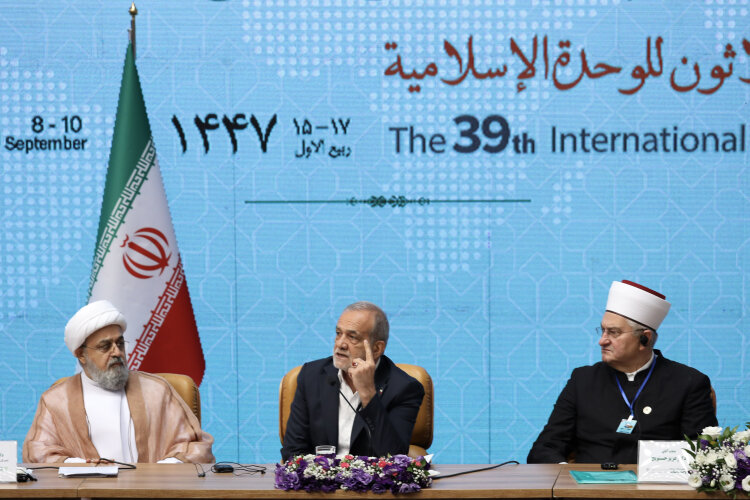TEHRAN – Iranian President Masoud Pezeshkian spent much of his time at a conference marking the Islamic Unity Week in Tehran making general remarks about how unity among Muslims is important, and how cohesion will benefit all Muslim nations in the region. At one point though, he took a more firm and straightforward tone, asking regional states to do more than condemnation in addressing Israel’s unchecked violence in the region.
Pezeshkian said he appreciates statements by regional countries which condemned Israel’s 12-day aggression against Iran back in June, but the statements do not cut it. “We appreciate the condemnation of Israel’s crimes by Muslim countries, but this is not enough,” the president said to a room full of officials and Islamic scholars. “We must stand stronger, more firmly, and more cohesively with a united front against Israel. Only then will we achieve honor for ourselves. There is a heavy responsibility on all of us.”
Israel launched a devastating war against the besieged Gaza Strip in October 2023, following a successful infiltration by Palestinian Resistance forces into occupied territories, which resulted in the death and capture of a number of Israelis. To date, the regime has killed over 60,000 Gazans, destroyed homes, schools, mosques, churches, and hospitals, and imposed a deadly siege on the territory. The flames of the regime’s violence have gradually spread across the region, engulfing Lebanon, Iraq, Syria, and, most recently, Iran. Meanwhile, Israelis have begun occupying new areas in Lebanon and Syria.
Apart from Iran and Yemen, most Muslim states have attempted to distance themselves from Palestinians over the past two years. Some, including Saudi Arabia, the UAE, Jordan, and Turkey, have been accused of providing arms and oil to Israel during the war, as well as helping to undermine the blockade imposed by Yemen in the Red Sea.
Leader of the Islamic Revolution, Ayatollah Seyyed Ali Khamenei, stated during a meeting with Iranian officials on Sunday that regional states must sever all economic and political ties with Israel. This marks the second time the Leader has directly called for such action since the war began. Other Iranian figures, including the president and foreign minister, have also repeatedly urged Muslims to cut ties with Israel through statements and direct communication.
The inaction of Muslim states in the face of Israeli actions against Palestinians has been a prominent concern among the masses since the war began. Beyond religious solidarity, which emphasizes the brotherhood and mutual support of Muslims, pan-Arabism has historically fueled calls for action against Israel. In recent weeks, however, fear and a sense of urgency have intensified in news articles and social media posts, demanding that Arab rulers take decisive action.
The fear stems from the concern that once Israel has dealt with the Resistance Axis – comprising Palestinians, Lebanese, Yemenis, Iraqis, and Iranians – the regime will turn towards establishing “Greater Israel,” a vision that requires the occupation of territories belonging to many of the states that have sought to remain neutral.
These renewed discussions were sparked by Israeli Prime Minister Benjamin Netanyahu’s statement that he “absolutely” feels connected to the vision of “Greater Israel” during a Hebrew media interview.
While his remarks drew angry condemnations from Arab states, the responses were again limited to words. Even after the controversy, some Arab rulers continued to collaborate with Israel on various issues. Saudi Arabia, for instance, is reportedly working with Israel and the U.S. behind the scenes to disarm Hezbollah, Lebanon’s most significant force against Israeli aggression for decades.
Israel also recently announced it is in discussions with several countries to accept Gazans, a project the UAE has reportedly offered to assist with by facilitating the transfer of Palestinians.
“Arab rulers are helping Israel defeat the Resistance, so Zionists can target us next,” stated one Arabic user on X. His post has garnered over 200,000 views on the platform.
